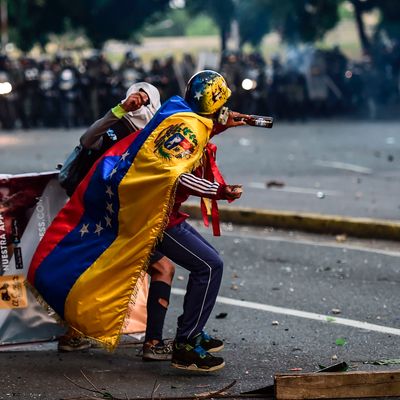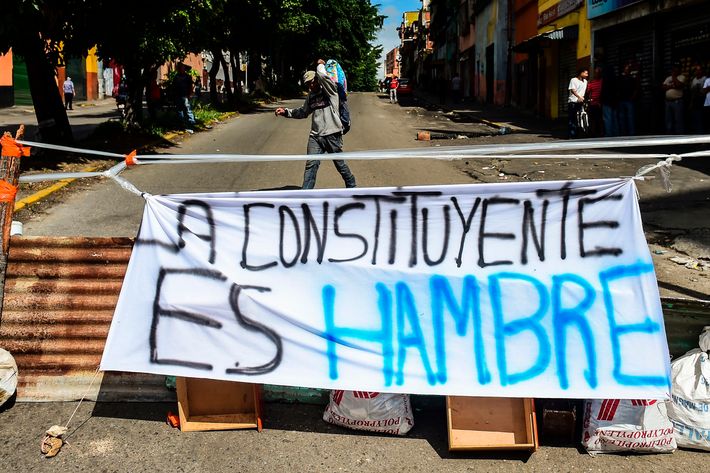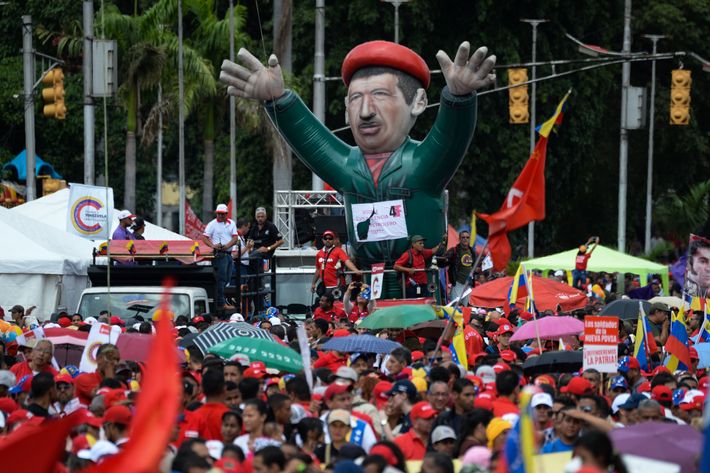
This Sunday, Venezuelans will vote to elect a constituent assembly that will be charged with rewriting the country’s constitution, which President Nicolás Maduro claims is the only way to restore stability to the troubled country after months — well, years — of unrest. The Venezuelan opposition, however, and much of the international community have decried it as a transparent effort to consolidate power in the hands of the presidency and neuter the opposition-controlled National Assembly, completing Venezuela’s transformation into a one-party dictatorship.
To say that Venezuela is on the verge of a crisis is an understatement. Despite having the world’s largest reserves of crude oil, corruption and mismanagement (or a vast, American-led, international capitalist conspiracy, depending on your sources) have driven the economy into the ground over the past few years. Hugo Chávez’s socialist Bolivarian revolution, launched in 1999, has descended into an abject nightmare under his successor. What was once a relatively wealthy country with a functioning democratic system is now literally starving, its currency nearly worthless, its politics polarized to the point of crisis, and its government increasingly authoritarian in its behavior.
The crisis has been mounting for years, going back well before Chávez’s death in 2013, but has reached an acute phase over the past several months. In March, the Venezuelan Supreme Court held the legislature in contempt for allegedly blocking efforts at economic relief and stripped it of its powers. The court soon backtracked in the face of overwhelming international condemnation, but the confrontation set off an ongoing wave of protests in which over 100 people have been killed — though most of the violence between police and protesters has been nonlethal and relatively restrained.

The opposition, which Maduro has sought to paint as right-wing terrorists, is boycotting Sunday’s vote. It also called a general strike last week and had planned massive demonstrations for Friday, prompting the government to impose a ban on all protests ahead of the vote and deploy some 370,000 troops throughout the country (a few small protests took place on Friday anyway). The U.S. is preparing for chaos, ordering relatives of diplomats to evacuate Caracas, giving embassy workers permission to leave as well, and warning Americans not to travel to Venezuela.
Employees of the U.S. government may be smart to get out of Dodge, as the Venezuelan government is now accusing the U.S. — specifically Florida senator Marco Rubio and the CIA — of plotting to topple it. Pro-Maduro media has leapt on comments made the other day by CIA director Mike Pompeo — that the agency was “hopeful that there can be a transition in Venezuela” and that he had recently been in Mexico and Colombia to discuss the situation with officials there — as proof that the U.S. is plotting regime change with these countries.
Rubio has been instrumental in the Trump administration’s response to Maduro’s power grab, which has entailed adding more names to the list of Venezuelan officials under financial sanction. The Miami Herald, whose home city hosts the largest Venezuelan-American community in the U.S., praised this move in an editorial published on Wednesday, arguing that “the Venezuelan people need the strong support of the international community to save their country from the mess into which their incompetent government dragged them kicking and screaming.”
Not every expert agrees that sanctions will help matters, however: In an op-ed at the New York Times, Washington Office on Latin America senior fellow David Smilde counters that sanctioning Venezuelan officials only cements their loyalty to and dependence on the regime. Broader economic sanctions that would punish Venezuela’s nationalized oil industry would be even worse, Smilde argues, because they would only impose more suffering on the Venezuelan people and none on its leaders, helping “bolster Chavismo in Venezuela for the next 55 years, just as they did for the Castros in Cuba.” His less-than-satisfying solution is for the U.S. to help facilitate (but not lead) a coordinated, multilateral diplomatic effort by a group of other Latin American countries.

With the opposition boycotting Sunday’s vote, the outcome looks like a foregone conclusion. But that also means it won’t give an accurate picture of how much support Maduro’s plan for a new constitution actually enjoys (which is why opposition boycotts of elections are often counterproductive). How many Venezuelans still back Maduro, heir to his mentor Chávez’s revolution, is virtually unknowable, given the paucity of independent polling data and the partisan nature of every available source.
One recent poll by Datanálisis, for instance, put Maduro’s support at roughly a paltry 20 percent, but Datanálisis is a pro-opposition pollster, so the Chavista establishment and its international supporters consider its numbers little more than right-wing propaganda. The opposition claims that 7 million opponents of Maduro voted by vast margins against the constituent assembly in a symbolic plebiscite they organized earlier this month, but that vote has no bearing on Sunday’s outcome, and pro-government analysts say the opposition’s reported-vote total is impossible. (The government, of course, denounced the unofficial vote as illegal.)
Indeed, few countries draw such polarized coverage as Venezuela has under Chávez and Maduro, whom many on the American and European left consider unfairly maligned democratic visionaries, while depicting the opposition as right-wing racists propped up by Western imperialism. But now that the realities of this corrupt crony socialism have been laid bare, with Venezuela enduring mass hunger and the highest murder rate in the world, Chavismo is getting ever harder to defend. Democracies just don’t deploy the army to quash protests, imprison opposition leaders, shut down disfavored media outlets, or rewrite their constitutions at the president’s whim.
Sunday’s vote and its aftermath could spell one of two disasters for Venezuela: the consolidation of dictatorship or outright civil war. If Maduro persists in his attempt to stifle all opposition, at least one of these outcomes is bound to occur. The country is unstable enough, and elements of the opposition angry enough, that violent conflict is very much on the table. As Slate’s Joshua Keating points out, Latin America has made great strides toward democracy and stability in recent decades, but those gains remain fragile. If Venezuela’s last vestiges of democracy collapse this week, he fears, this could have consequences beyond its borders.





























